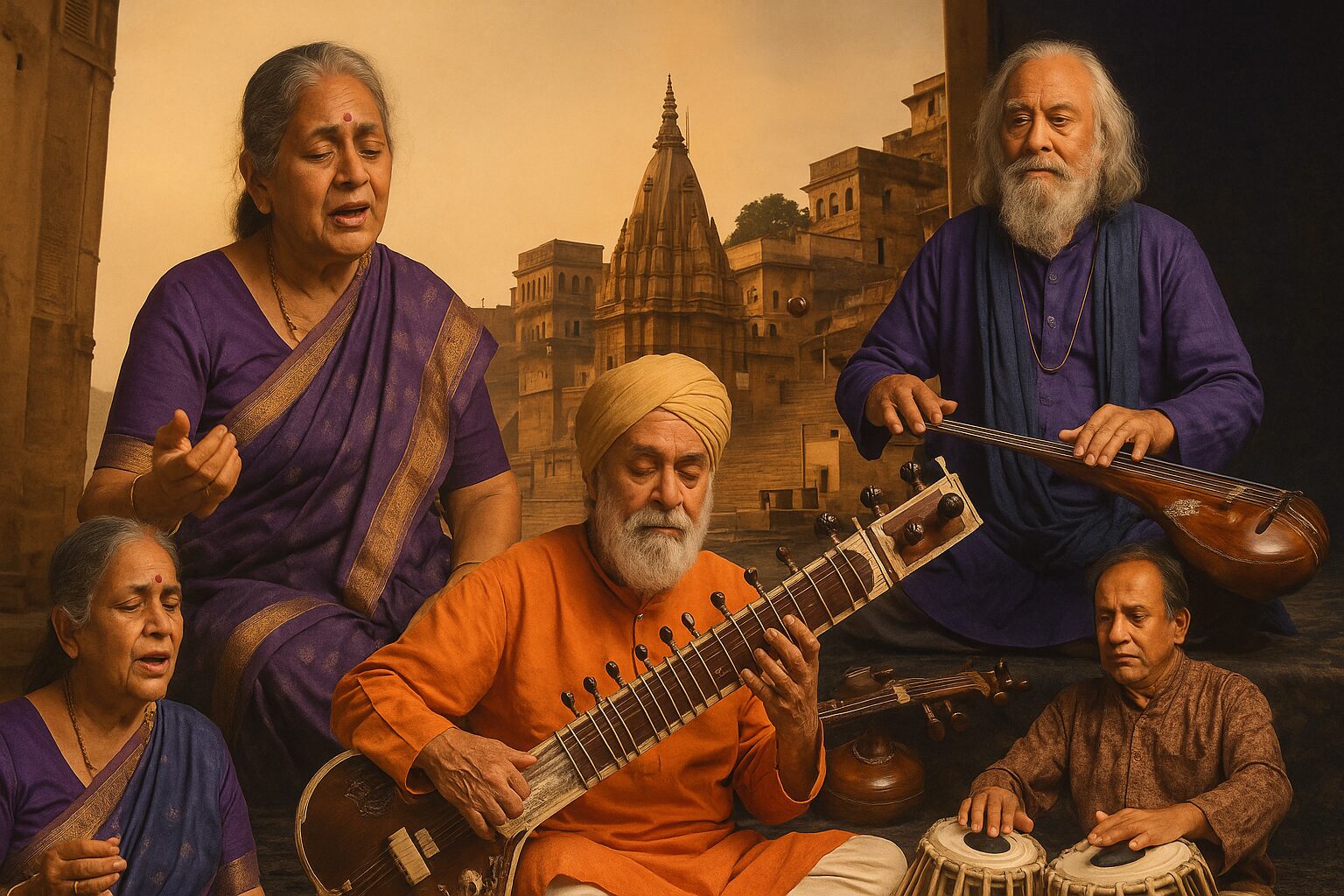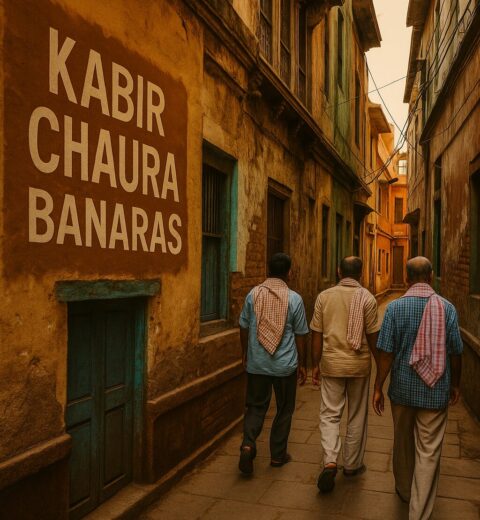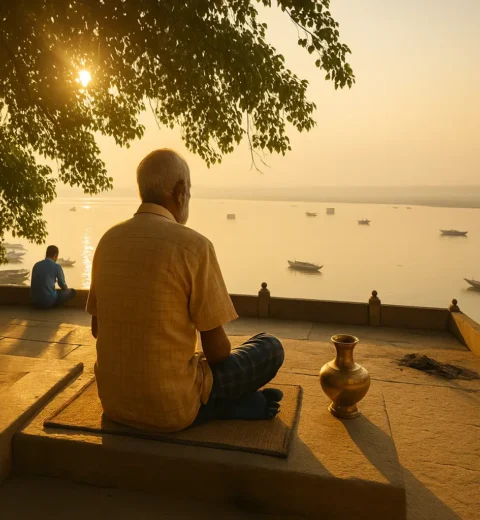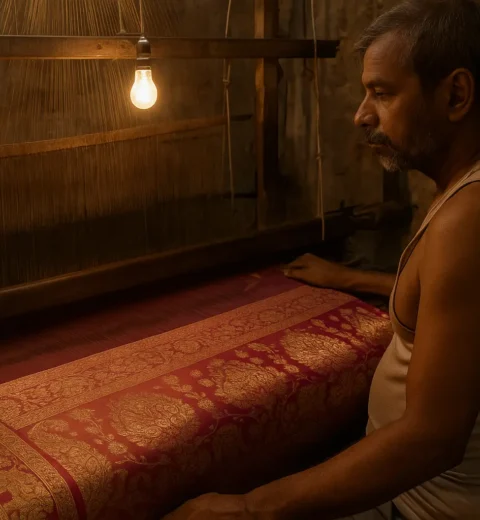Varanasi, the spiritual capital of India, is not only the land of temples and ghats, but also the cradle of India’s rich and ancient music tradition. Music here is not merely entertainment—it is sadhana (spiritual practice), an offering to the divine, and a powerful expression of devotion, love, and life itself. The roots of music in Varanasi trace back to Puranic times, with Lord Shiva himself believed to be its original patron. Legends also credit sages like Vishwamitra and Mahagobind with nurturing this tradition, while celestial beings like Gandharvas, Apsaras, and Kinnaras are said to have performed divine music in the ghats and temples of Kashi.
Over the centuries, saints like Chaitanya Mahaprabhu and Vallabhacharya played pivotal roles in spreading this spiritual form of music, embedding it deeply in the city’s identity. Today, the music of Varanasi stands as a living heritage—intensely spiritual, deeply expressive, and proudly preserved through generations.
The Banaras Gharana – A Legacy in Sound
The city is home to the prestigious Banaras Gharana, one of the most prominent schools of Indian classical music. Known for its purity of form and deep emotional expression, the Banaras Gharana is revered for both vocal and instrumental styles.
The classical vocal traditions here are incredibly diverse, encompassing:
- Dhrupad – the most ancient and meditative form of Hindustani music.
- Dhamar – rhythm-heavy compositions often performed during Holi.
- Kheyal – emotional and expressive melodic improvisations.
- Tappa – light classical music marked by intricate taans (fast-paced note patterns).
- Thumri – romantic and devotional songs, expressing longing, separation, and bhakti.
- Hori, Chaturang, Ragasagar, Tarana, and Sargam – which enrich the palette of Hindustani classical music.
Among the folk traditions, Kajri and Chaiti hold a special place in Banaras. These seasonal songs, often sung during monsoon and spring, reflect the earthy moods of the region and resonate in the voices of wandering minstrels and temple singers.
Legends and Luminaries of Banaras
No discussion of Banaras music is complete without mentioning the maestros who have carried its sound across the world.
- Pandit Ram Sahai, founder of the Banaras tabla gharana, revolutionized the art of tabla playing 200 years ago in Kabir Chaura, a neighborhood that remains the beating heart of the city’s musical culture.
- His legacy was furthered by Pandit Sharda Sahai, Pandit Samta Prasad, and Pandit Kishan Maharaj, all of whom elevated tabla to solo performance status.
- The world-renowned Ustad Bismillah Khan, whose shehnai became the voice of India’s independence, was born and nurtured in the bylanes of Varanasi.
- The divine voice of Girija Devi, the evocative renditions of Begum Akhtar, and the soulful sitar of Ravi Shankar, all trace their musical roots to this sacred city.
- Varanasi was also home to Kathak maestros like Birju Maharaj and Kishan Maharaj, as well as Baba Allauddin Khan, whose disciples shaped global classical music.
Where Music Lives – Temples, Rooftops & Ghats
What makes Varanasi unique is that music here is not confined to auditoriums or formal concerts. It resonates in temples during early morning prayers, floats along the Ganga with boatmen singing age-old folk tunes, and rises from rooftop gatherings where students practice under the gaze of their gurus. It echoes in the narrow lanes, during seasonal festivals, at Akharas where rhythm meets wrestling, and in evening aartis where chants blend seamlessly with raga.
Weekly concerts, public performances, and annual festivals like the Dhrupad Mela, Bharat Milap, and Mahashivratri music gatherings reinforce this living tradition.
UNESCO Recognition – A City of Music
This unbroken tradition and deep musical culture led UNESCO to designate Varanasi as the ‘City of Music’ in its Creative Cities Network. The recognition is not just for its past glory, but for the thriving, dynamic, and spiritual culture of music that lives on in every corner of this timeless city.
Conclusion
Music in Varanasi is not just an art—it’s a way of life. It is an inheritance passed through generations, a practice rooted in bhakti (devotion), a connection to divinity, and a universal language that transcends caste, creed, and nationality.
Whether you are a classical connoisseur, a spiritual seeker, or a curious traveler, Varanasi offers a musical experience that is both soul-stirring and eternal.
Come, listen. The city still sings.





